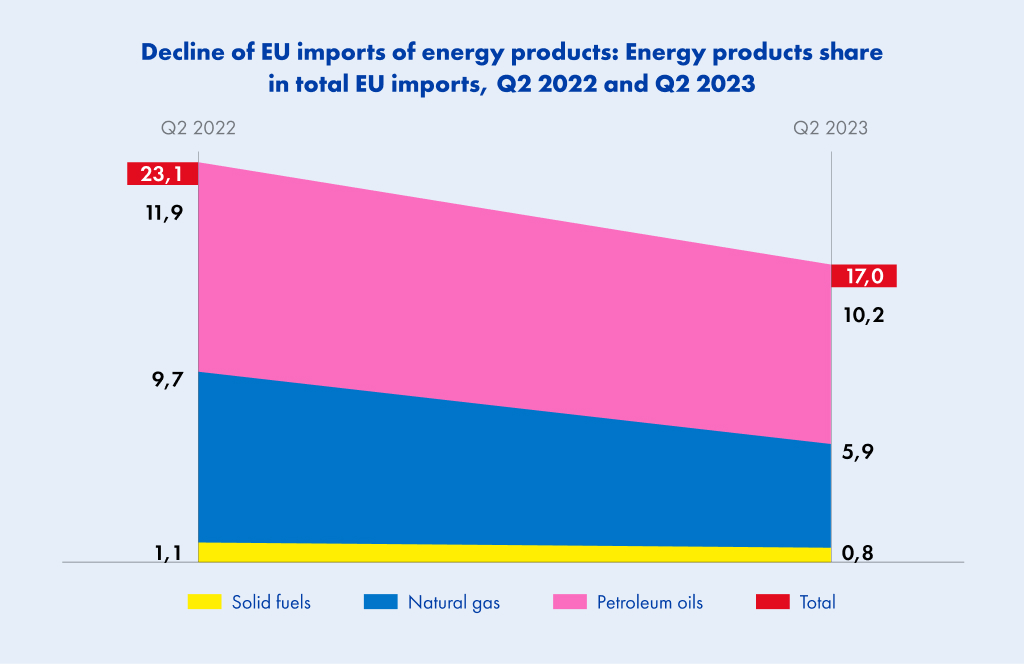Issue #140
Guten Morgen! Servus again! Instead of running for fireworks, get your beers ready. Germany is preparing for its 33rd birthday of unity, but the mood is not really up for partying. In this special edition of the krautshell, we are thrilled to have a house’s view from Dr. Steven E. Sokol, President of the American Council on Germany, where he discusses shifts in Germany’s political landscape, highlighting the challenges faced by the governing coalition and the rise of fringe parties. In addition, we take a look at Europe’s hottest open position (no, Bundestraining is already taken) and how Germany’s dip into digitization turned into a deep dive into the AI trench with limited oxygen. And yes, we will take a look at how Germany is celebrating its 33 years of unity by revisiting its old and extreme traditions. To mellow the tone, we also have a quick visual overview of the EU’s energy imports. Lastly, Christian taps into the spicy and controversial scene in Bavaria, where it wasn’t just the kegs that were tapped this year but also the pulse of Bavarian and German politics. Sit back, fasten the seat belt, and get ready for a bumpy ride. Of course, we wish you a relaxed weekend and a great start to the new week. Anna Szilvia WHAT TO WATCH THIS WEEK: EIB Presidential Race: High-Stakes Musical Chairs for EU’s Elite A temporary work contract nearing its end is always a nerve-wracking rollercoaster. But guess what? This anxiety isn’t unique to us mere mortals; even the European Union big shots know the struggle. With the European elections looming a year ahead, EU Commissioners are hustling for their next gig. Two have already packed their bags and returned to national politics (among them the former VP of the EU Commission, Frans Timmermans). The rest, who couldn’t land plum positions back home, are eyeing the prized role of President of the European Investment Bank (EIB). Margrethe Vestager, the EU’s fair competition guardian, has already formally thrown her hat into the ring and is on unpaid leave from her post as Executive VP of the Commission. Trouble is, she’s not the sole hat-tosser; four others are in the ring, with Spain’s Finance Minister, Nadia Calviño, being her top contester. The recent EU finance ministers’ meeting was supposed to end the suspense, but none of the five applicants could muster enough support. As they say, when five people quarrel, a sixth rejoices…Rumors are circulating in Brussels that European Commission Executive VP (yes, another one) Valdis Dombrovskis is also weighting is chances for the top-job. Why all the fuss? Well, the EIB is hotter than a summer day in the Sahara right now. With a digital and green transition underway and a war raging in front of the EU’s door, the EIB has become the answer to financing European projects. The next EIB president gets to set the agenda, and Vestager’s busy courting Eastern European countries while Calviño may opt for a focus on Southern countries. The EIB race is turning into a nail-biter, and for those with expiring contracts, it’s time to take a leap and see if you can land a soft spot in this EU circus. INSIGHTS FROM PARLIAMENT: Let’s talk AI! As is the trend sweeping across nearly every corner of the world today, the German Parliament has also taken a deep dive into the world of Artificial Intelligence (AI) this week. As the one sitting at the opposition bench, the CDU/CSU parliamentary group has the freedom to come up with great ideas, without necessarily needing to care how they could be implemented (not that the government tend to do this as well for time to time, well). The CDU/CSU parliamentary group is on a mission to bolster the infrastructure for AI and deep learning. Their goal is to foster large-scale AI models, with a particular focus on supporting startups and open-source initiatives across Europe. This and other ambitious endeavors were laid out in a motion that recently underwent discussion in parliament. The MPs advocate for beefing up hardware and establishing a dedicated “governance structure” to facilitate AI model development. They also call for the integration of quantum computers into supercomputers and the creation of platforms for quantum-assisted AI. Furthermore, they champion the development of quantum-assisted machine learning methods. However, some critics argue that this ambitious plan may overstretch resources and divert attention from more pressing issues – which, when it comes to digitalization in Germany – we have in abundance. When it comes to AI, Germany seems to be the one arriving fashionably late to the party. Picture it: a representative study by BITKOM reveals that only a mere 2% of the surveyed companies see Germany as a leading AI nation. As for whether Germany can make up for lost ground, only time will tell. Meanwhile, Europe’s top policymakers are set to converge in Strasbourg next week to further discuss the AI Act. Get ready to stay awake for the European AI revolution… or at least, keep your coffee close by! THE BIG PICTURE: Deutsche Einheit und Race to the Right ?! / Un-Happy National Day! Germany is celebrating 33 years of unity on October 3, but don’t expect fireworks and BBQs like the Fourth of July. Nope, for most Germans, it’s just a chance for an extra-long weekend and national pride is socially only acceptable when it comes to sports and beer. But hey, defending democracy is still a thing, right? East vs. West, it’s a tale as old as time, and Germany is still figuring it out. This season, right-wing extremism is back on the agenda, causing a bit of a headache, especially in some East German states, thanks to the Alternative for Germany (AfD) party. They’re so extreme they even have the Office for the Protection of the Constitution keeping an eye on them. In Thuringia and Brandenburg, in the East, the AfD is getting a whopping 32% support in the polls. Saxony’s taking the cake with 33%. That’s not exactly the fun kind of competition. But hold on, the West has some serious struggles too. For example, Bavaria’s Vice President, Hubert Aiwanger, faced allegations of being labelled “the school’s Nazi,” and despite his mishandling of the situation, he retains his position (and, just a week before the state election in Bavaria, the polls suggest that his party is profiting from the whole affair). Also, Hesse has seen bad events linked to right extremism over the last few years, with a district president being shot dead in front of his own home in 2019. Last year, nine people lost their lives in a right-extremist and racist attack in the state. So, it is not just an East German thing. With elections coming up in Hesse and Bavaria on October 8, and Brandenburg, Saxony, and Thuringia in the fall of 2024 – national unity, we’ve got some work to do! Source: ec.europa.eu THE (GUEST) HOUSE’S VIEW: by Dr. Steven E. Sokol, President and CEO of the American Council on Germany Germany’s Political Landscape May be Changing – and It is Not for the Best The month of September has not come to an end, and here I am again. Lucky me! Earlier this month – in my first (Guest)House View after the summer break – I wrote about the sticking points within the governing coalition and the tensions between the three parties in the Ampel. Since then I spent a week in Germany, and was able to measure the political pulse. Along with questions about the U.S. election (and whether Donald Trump could actually win in 2024), the main topics of concern revolved around immigration, growing populism, and the strength of the Alternative for Germany (AfD) in national and regional polls. Let me share some observations: The Governing Coalition I often find myself reminding non-Germans that while coalition governments are common, this government is unique because it consists of three very different political parties (the Social Democrats, the Greens, and the Free Democrats) – and that certainly within the SPD and the Greens there are two camps, the progressive Fundis and the more mainstream Realos. It is almost as if Chancellor Olaf Scholz has to keep five parties in line. Disagreements between the three coalition partners have become public and are eroding public confidence in the government. According to a poll earlier this month, only 19 percent of respondents said that they are satisfied with the Ampel. Despite these polling numbers, a study published in September showed that almost two thirds of the 453 major and minor commitments by the coalition have been implemented or are in the works. Taken together, there is a glaring discrepancy between public opinion and the achievements of the coalition. The Political Landscape is Shifting While in Berlin, I once again heard people talking about Politikverdrossenheit (or a sense of apathy when it comes to politics) – and when one considers the polling numbers, there is growing resentment and dissatisfaction with the state of German politics. This has led to a splintering of the political landscape. There are now seven parties now represented in the Bundestag – and the main catch-all parties (Christian Democrats and Social Democrats) have been losing traction. Meanwhile, the parties on the fringes – especially on the right – are gaining ground. Inflation, high energy costs, and concerns about the economy have helped boost support for the anti-establishment parties. But, the war in Ukraine, migration and the uptick in refugees, and the spats within the Ampel have contributed to support for the AfD in polls. State Elections as a Political Test Upcoming elections in Bavaria and Hesse next month – and in the three eastern German states of Brandenburg, Saxony, and Thuringia a year from now – will serve as an important bellwether for political trends. (Please don’t read too much into each election on its own, but taken together we are likely to see trends.) In Bavaria, the Christian Social Union (CSU) is governing with the Freie Wähler (Free Voters). The CSU is polling at 36 percent – down from 45 percent – and is losing votes to the more populist Free Voters, who are up to 30 percent in the polls despite the recent scandals involving Deputy Premier Hubert Aiwanger (Free Voters). This has the potential to upset Minister President Markus Söder’s potential aspirations to be the Kanzlerkandidat for the CDU/CSU. Meanwhile, in Hesse, the incumbent Minister President Boris Rhein (CDU) is being challenged by Federal Minister of the Interior Nancy Faeser (SPD). The CDU is the strongest party in polls and SPD and Greens are competing for second place, followed by the AfD. Migration and refugees as well as domestic security are at the heart of the race. Normalization of the AfD? According to Anna-Sophie Heinze, a political scientist at the University of Trier, there has been a gradual shift as the AfD has established itself as a party. “The AfD has become extremely adept at breaking taboos,” she says. “We are no longer seeing the same waves of outrage that we used to.” This is a worrisome trend in the run up to election in Bavaria and Hesse this year and in the three eastern German states next year. (In the east, the AfD is the strongest party in polls and we have seen some wins at the local level.) Intelligence services at both the state and federal level have classified the AfD as a party “of interest” – and it is under observation in Thuringia. Most mainstream parties have stated they will not cooperate with the AfD at a regional or federal level. But, it will be difficult to limit a democratically elected party – even if it is anti-democratic in its beliefs and at its core. Meanwhile on the Far Left… Die Linke (the Left Party) was created in 2007 as an alliance between the post-communist party in eastern Germany and leftist Social Democrats. While it has had some gains in recent years, it is fragile – with 4 to 5 percent in polls – and is likely to splinter further. Sahra Wagenknecht, one of the party leaders, has been making noises about leaving the Left Party and starting a new party – which could appeal to voters at the far left and far right of the political spectrum. She is very critical of the Ampel’s economic policies and advocates pro-Russian and anti-NATO sentiments. One poll suggested that a Wagenknecht party could take first place in Thuringia next year, but another poll found that only two percent of Germans would support her in a national election. What does this all mean? The parties on the fringes are proving that they can take advantage of issues like the state of the German economy, the war in Ukraine, the increase in migrants, rising energy prices and the building heating reform bill (Heizungsgesetz), among other issues to mobilize their base. If you are interested in parsing German politics, watch what happens in the state elections and the EU elections next year – and watch what is going on in the far right and far left of the political spectrum in Germany. The German federal elections in late 2025 are in an political eternity. A lot can change between now and then, but the question I am asking is: Can Germany’s political extremes become more mainstream by then? Here are three appointments for next week that you should have on your radar: You drink what you tap In recent issues, we’ve often touched upon the reasons for the rise of the AfD (Alternative for Germany). In just 8 days, there will be an election in Bavaria, and the Free Voters party, which we have discussed before, is making waves. Currently, the CSU (Christian Social Union) is losing ground, while both the AfD and the Free Voters are gaining. Not only has the beer been tapped at Oktoberfest, but so has the power of the long-ruling CSU with its Prime Minister and Party Leader, Markus Söder. Interestingly, in Bavaria, a place where from (lefty-green-ish) Berlin’s perspective, the CSU is already seen as right-leaning populist, there are now TWO parties that use even stronger rhetoric than Söder. The “Free Voters”, coalition partners of the CSU, aren’t far-right or populist. Politically, they’re essentially a party for conservative-liberals: very democratic but dissatisfied potential CSU voters. Their chairman, Aiwanger, often matches the brash tone of extreme left or right ideologues, with remarks like “They (in Berlin) have lost their minds” and “we’ll reclaim our democracy”. Gone is the traditionally royal-Bavarian tone of speech, replaced with a confrontational, beer-in-your-face attitude. Then, some of Aiwanger’s opponents pushed a suspicious, and indeed newsworthy affair, onto several media outlets. It revolved around an anti-Semitic leaflet found in his school bag. An ugly affair, which took place during his school years, some 30 years ago. He rightly had to apologize, confirming that it was a tasteless joke from back then. Metaphorically, he got a cold non-celebratory beer shower. You reap what you tap. But then, again 🙄: Self-righteous journalists and seemingly beer-fueled intellectuals have also crossed certain lines. We know that especially Germany’s green-left officials in politics and journalism like to play moral champions. Sadly, this “moral preaching” is costing some trust in what was once a reasonable center. Attacking Aiwanger this time are many, from the Munich studio director of ZDF (a major German broadcaster), to major media houses and TV show guests, because: Aiwanger suspects a long-planned campaign to bring up his youthful misdeeds just before the election (which actually is the case🤷). Now, instead of preventing the character of a smear campaign and examining this serious matter and his personality, he is now accused of reversal of victim and perpetrator roles and embracing ‘Trumpism’. This isn’t just inadequate; it’s a grave misstep by the moralists. It’s rather vague, a touch of opinion-shaping, taboos, and acting as if he said 30 years ago that one wrote or distributed a leaflet to defend oneself against Jews (that would be a reversal of the roles and playing the victim) or as if he were proud of it and had done exactly the right thing, or that everyone else is lying about the facts (that would be ‘Trumpism’, if such a thing exists). Of course, the people see through this, fear a totalitarian democratic culture, and are fed up, choosing to vote in protest against the mainstream media’s reckless overreactions. Thanks, ZDF and others: The right-wing strengthened, democracy tapped. Cheers! Issue #140


FIRST, SOME SOLID INTEL:
TAKE A BREAK, GIVE YOUR EYES A REST.


LONG STORY SHORT:
OUTLOOK:
When?
What?
October 2nd & 3rd, 2023
AI Act Trilogue
October 3rd, 2023
Germany Unity Day
October 8th, 2023
State Elections in Bavaria and Hesse
WHAT’S ON OUR MINDS:





